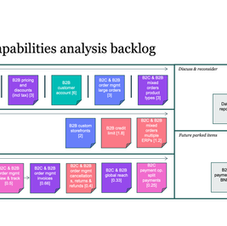From Plateau to Breakthrough: Designing for B2C & B2B Growth
Listened to customers, spotted untapped markets, and reignited retention
TL;DR
-
Delivered a growth strategy that expanded into B2B markets, boosted retention, and prioritised high-ROI features.
-
Led 20 UX and Product specialists, owning strategy, delivery, and optimisation
-
Outcomes:
-
Cross-functional strategy that promotes shared goals and priorities, backed by executive leadership
-
Prioritised feature list for growth with ROI estimates and KPIs to track the customer journey.
-
User-centred design that evolved a B2C business into a hybrid B2B/B2C model.
-
Project overview
In 2021, the University of Cambridge embarked on an ambitious journey to reinvent its executive online education portfolio. My role as UX and Product Director placed me at the intersection of vision and execution, collaborating closely with Engineering, Marketing, Sales, Operations and Leadership teams. The challenge: evolve from a single-brand platform (“Cambridge Advance Online”) to a unified, multi-brand experience (“University of Cambridge Online”), serving both B2C and B2B customers across the globe.
Problem statement
The rapid growth of online learning brought new complexities:
-
The platform’s MVP hadn’t evolved to address emerging gaps in the B2C customer journey.
-
B2B clients required tailored functionality and a new sales approach, from SME to enterprise level.
-
The transition to a multi-brand presence demanded coordinated strategy across diverse business functions: Product, UX, Technology, Operations, Marketing, Sales, Customer Service, and Technical Support.
My approach
My methodology was systemic, evidence-driven, and collaborative, anchored in a comprehensive understanding of both user and business needs.
User & business research
-
Conducted a blend of qualitative interviews and quantitative data analysis to uncover deep user pain points.
-
Mapped the competitive landscape and internal stakeholder ambitions to ensure solutions aligned with business goals.
Scenario development & journey mapping
-
Outlined purchase scenarios (single course, multiple, custom programmes) for all customer segments (self-funded, employer-funded, B2C and B2B).
-
Created proto-personas and selected three priority journeys reflective of future target audiences.
Facilitation & synthesis
-
Led three cross-functional workshops, engaging stakeholders at all levels to map end-to-end user journeys for personas: Aisha, Brian, and Chun.
-
Synthesised insights into high level customer journeys, validating with workshop attendees and presenting outcomes across the organisation to foster alignment.
Opportunity identification & iteration
-
Extracted and prioritised key opportunities, then iteratively improved interactions and experience through feedback loops and rapid prototyping.
-
Developed measurable OKRs and KPIs for every phase, ensuring business and technology teams remained aligned on customer outcomes.
Outcome & impact
-
Delivered a three-year strategic roadmap incorporating B2C optimisation, B2B acquisition, and the seamless migration to a unified platform.
-
Introduced a system for continuous measurement, allowing for ongoing experimentation and data-driven improvement.
-
Fostered a user-centred culture, uniting previously siloed teams around a shared vision of excellence in online education.
Reflection
This project exemplifies my belief that exceptional user experience is a catalyst for organisational transformation. By championing cross-functional collaboration, evidence-based design, and relentless optimisation, I helped Cambridge not only respond to the changing digital landscape, but shape it building online learning journeys that are seamless, innovative, and truly valuable.

Explore additional case studies
-
Service Blueprint: A cross-functional, end-to-end view of customer interactions to identify opportunities and optimise the customer experience
-
UX Surgery: A comprehensive analysis of user pain points across the product ecosystem to inform continuous optimisation and drive action.
-
Research Repository: Centralising insights to democratise access and amplify research impact across teams.
-
Research Directions: Award-winning, forward-thinking product design driven by deep insight and innovation.












